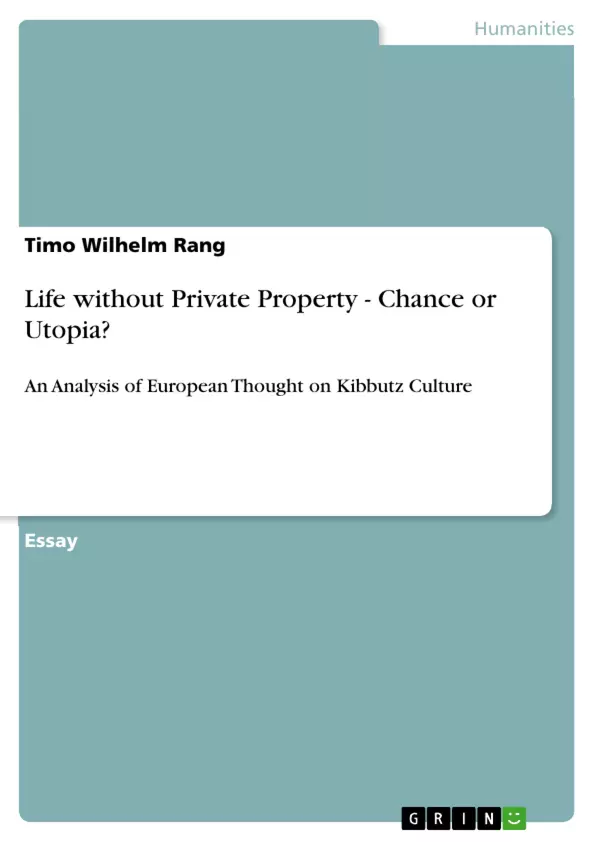Table of Content
1. Introduction
2. Kibbutz
2.1. What is a kibbutz?
2.2. The kibbutz culture today
3. European thinkers
3.1. John Locke
3.2. Jean-Jacques Rousseau
3.3. Karl Marx
4. Evaluation
Being brought up in the Western hemisphere after the fall of the communist bloc, private property seems to be a concept so essential and decisive for our everyday life that questioning its existence is hard to imagine. Already as a child one develops a sense of what is ‘mine’ and what is ‘yours’. Trivial as it may be it starts with toys or stuffed animals. An infant’s understanding and perception of the world can elevate the fact of owning a certain object to the center of interest – as everybody with brothers or sisters knows. An answer to the question why we allegedly legitimately claim things to be our property could be found in that fact that fully mature and reasoning beings behave in a similar manner. Exchange toys and stuffed animals for vehicles, jewelry, houses or the overall equivalent, money, and you will find adults as ambitiously working or fiercely fighting to get or defend their property as children. Individuals face constant unsatisfied needs and the necessity to posses more and more propagated by commercialized mass media. Western societies have developed an “entrainment-mentality” as former German Chancellor Gerhard Schröder put it. The unquenchable thirst for growth and the gluttony of the elites could lead one to the assumption that the excessive accumulation of property has perverted the very nature of humanity itself. Or is this picture of a purely materialistically driven society a worn out cliché from anti-capitalistic theories? Aren’t we rather experiencing a time in which we return to values beyond matter, not at last triggered by the financial and economic crises?
The question I would like to elaborate upon in this essay is whether societies need private property, whether the very functioning of human coexistence is dependent on it. Or could private property be merely a mode of thinking common in our latitudes and not an inevitable human trace that is found in every culture such as laughing, language or time? To illustrate this question I will refer to the kibbutz culture in Israel as an example of micro societies entirely abdicating private property, hierarchy and to a more limited extend privacy and individuality.
Inhaltsverzeichnis (Table of Contents)
- 1. Introduction
- 2. Kibbutz
- 2.1. What is a kibbutz?
- 2.2. The kibbutz culture today
- 3. European thinkers
- 3.1. John Locke
- 3.2. Jean-Jacques Rousseau
- 3.3. Karl Marx
- 4. Evaluation
Zielsetzung und Themenschwerpunkte (Objectives and Key Themes)
This essay explores the viability of life without private property by examining the Israeli kibbutz culture as an example of a micro society that has abandoned private property, hierarchy, and, to a lesser extent, privacy and individuality. The essay investigates the main characteristics of kibbutzim, their historical development, and their current state. It then analyzes the perspectives of influential European thinkers like John Locke, Jean-Jacques Rousseau, and Karl Marx on the concept of private property and how their theories relate to the kibbutz model.
- The nature of private property and its significance in Western societies
- The historical and ideological origins of the kibbutz movement
- The principles of collective living and social justice embodied in kibbutz culture
- The challenges and changes facing kibbutzim in contemporary Israel
- The perspectives of influential European thinkers on private property and its implications for social organization
Zusammenfassung der Kapitel (Chapter Summaries)
The introduction lays out the argument that private property is often taken for granted in Western societies and explores the potential implications of a society without it. It then introduces the kibbutz culture as a real-world example of life without private property and outlines the essay's structure.
Chapter 2 delves into the concept of the kibbutz, its historical roots in Zionist and socialist ideology, and its core principles of collective living, equality, and social justice. It highlights the centrality of communal welfare over individual aspirations and the absence of both personal and productive private property. The chapter concludes by examining the contemporary situation of kibbutzim, hinting at challenges to their traditional model.
Schlüsselwörter (Keywords)
The key themes and concepts explored in this essay include private property, kibbutz culture, collective living, social justice, equality, hierarchy, individualism, European thought, John Locke, Jean-Jacques Rousseau, Karl Marx, and the historical and contemporary context of the kibbutz movement in Israel.
Frequently Asked Questions
Is a society without private property possible?
Yes, the Israeli kibbutz movement serves as a real-world example of micro-societies that successfully abdicated private property for decades.
What are the core principles of a kibbutz?
The core principles include collective living, equality, social justice, and the absence of personal ownership of productive assets.
How did Karl Marx view private property?
Marx viewed private property as a source of class struggle and alienation, advocating for its abolition to achieve a classless society.
What was John Locke's stance on property?
Locke argued that property is a natural right derived from an individual's labor, which forms the basis of Western liberal thought.
What challenges do modern kibbutzim face?
Modern kibbutzim face challenges like privatization, the desire for more individual privacy, and the need to adapt to a globalized capitalist economy.
- Quote paper
- Timo Wilhelm Rang (Author), 2010, Life without Private Property - Chance or Utopia?, Munich, GRIN Verlag, https://www.grin.com/document/182647



